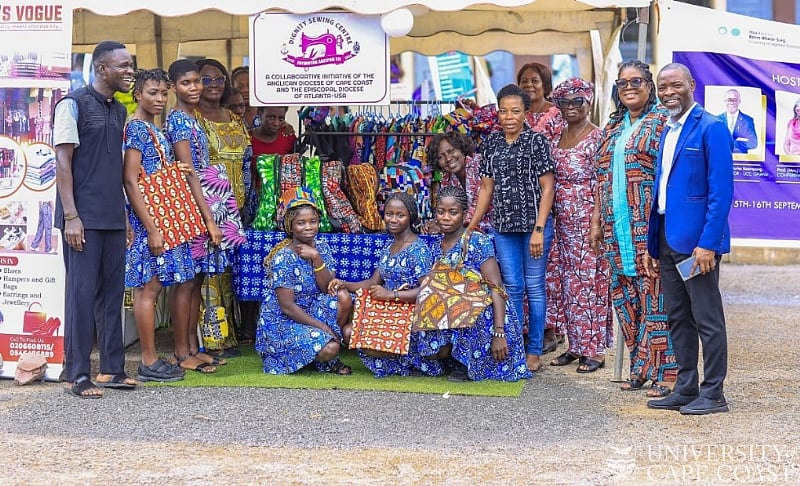The Universities, Entrepreneurship, and Development (UEED) Conference, held at the University of Cape Coast (UCC) in September 2025, served as a crucial platform for fostering innovation and entrepreneurial skills among students and community members. The conference, themed “Innovative and Inclusive Entrepreneurship and Enterprise Development for a Sustainable Green and Blue Economy in Africa,” aimed to equip attendees with the practical knowledge and skills necessary to generate innovative business ideas, whether they choose to launch their own ventures or contribute to existing organizations. The overarching vision of the conference was to bridge the gap between theoretical knowledge and practical application, enhancing student employability and driving innovation within the business landscape.
The UEED Conference boasts a rich history, originating 13 years prior through a partnership between UCC and Hochschule Bonn-Rhein-Sieg University of Applied Sciences. Over the years, the conference has expanded its reach, welcoming the University of Nairobi, Kenya, the International Financial Management University, Tanzania, the University of Koblenz, Germany, and other partners into its collaborative network. This year’s conference placed a particular emphasis on addressing challenges within the secular economic space, specifically focusing on the green and blue economies and their potential for sustainable development in Africa.
The focus on the green economy stemmed from the pressing environmental concerns facing Ghana, particularly the devastating effects of illegal mining. The conference recognized the urgency of finding solutions to mitigate environmental damage and promote sustainable practices. The blue economy, focusing on the sustainable management of marine resources in the face of climate change, also took center stage. Discussions revolved around sustainable aquaculture practices in fishing and promoting inclusivity within the blue economy sector. This emphasis on both green and blue economies highlights the conference’s commitment to addressing the complex interplay between economic development and environmental sustainability.
Beyond theoretical discussions, the UEED Conference provided a practical platform for showcasing innovation and entrepreneurial spirit. A vibrant exhibition featuring products and services from students and local community members served as a testament to the entrepreneurial drive within the region. This year’s event also incorporated faith-based businesses into the exhibition, further broadening the scope of entrepreneurial representation and fostering collaboration between the university and the wider Cape Coast community. This inclusive approach underscores the conference’s commitment to engaging diverse stakeholders in the pursuit of sustainable economic development.
The insights shared by conference partners and speakers further enriched the event. Mr. Oheneba, the keynote speaker from Hollard Insurance Ghana, emphasized the critical role of innovation and inclusivity in addressing Africa’s multifaceted challenges through entrepreneurship. He highlighted the urgency of tackling climate change and economic disparities, urging participants to explore innovative solutions. Mr. Oheneba positioned the green economy not merely as an environmental imperative but also as an economic opportunity, emphasizing the potential for job creation, innovation, and enhanced resilience in the face of climate change. His discussion of the blue economy underscored the need for sustainable use of oceans and freshwater bodies, particularly given the detrimental impact of illegal mining activities.
The voices of local entrepreneurs added a valuable perspective to the conference. Madam Lucy, representing the Dignity Sewing Centre, expressed gratitude for the opportunity to exhibit their products and share their mission of providing free skills training to those in need. Her appeal for sponsorship to expand their training programs highlighted the importance of investing in skills development to foster economic growth and empower individuals within the community. This emphasizes the conference’s commitment to fostering practical solutions and empowering local initiatives that contribute to sustainable development.
In conclusion, the 2025 UEED Conference served as a vital catalyst for fostering innovation, entrepreneurship, and sustainable development in Africa. By focusing on the green and blue economies, the conference addressed critical environmental and economic challenges facing the region. The event’s emphasis on practical skills development, knowledge sharing, and community engagement created a dynamic platform for empowering students, local entrepreneurs, and faith-based businesses. The conference’s success lies in its ability to bridge the gap between theory and practice, fostering a collaborative environment where innovative ideas can flourish and contribute to a more sustainable and inclusive future for Africa. The collaborative nature of the conference, bringing together academic institutions, businesses, and community organizations, ensured a multifaceted approach to addressing the complex challenges of sustainable development. The focus on practical application, as exemplified by the exhibition and the sharing of real-world examples, ensured that the conference’s message resonated with attendees and empowered them to take action. The emphasis on inclusivity, demonstrated by the participation of faith-based organizations and community members, broadened the scope of the conference and fostered a sense of shared responsibility for driving sustainable development. Ultimately, the UEED Conference served as a powerful reminder of the transformative potential of entrepreneurship, innovation, and collaboration in building a more sustainable and prosperous future for Africa.














